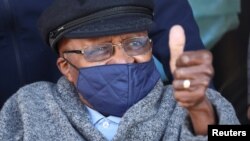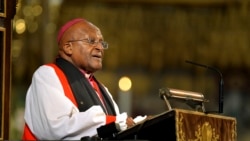As Desmond Tutu turns 90 on Thursday, he remains indisputably the moral voice of South Africa. But age is catching up with him.
The jovial emeritus archbishop retired in 2010 and rarely speaks in public, in a country that sometimes feels adrift without the leadership of its anti-apartheid liberation icons.
Even though South Africa has eased its COVID-19 precautions, the birthday festivities will be muted and largely online.
Renowned for his radiating energy and infectious laughter, Tutu is expected to attend a special service Thursday at St George's Cathedral, where he once held the pulpit as South Africa's first black Anglican archbishop.
Later that day, the Desmond and Leah Tutu Legacy Foundation will host an online lecture by the Dalai Lama, Ireland's former president Mary Robinson, rights activist Graca Machel and South Africa's ex-ombudswoman Thuli Madonsela, respected for her courageous exposure of corruption.
The line-up of speakers is a reminder of Tutu's values, surrounding himself with rights advocates at a time when South Africa's current leaders are better known for lavish lifestyles and billion-dollar bank accounts.
An online auction of his memorabilia last month raised $237,000 for the foundation named after him and Leah, his wife of 66 years.
The last time Tutu himself was seen in public was in May, when he and Leah went to receive their COVID-19 vaccinations.
He smiled and waved from a wheelchair outside a hospital, but didn't speak to journalists waiting outside — a far cry from the buoyant personality who captivated the world with his strident opposition to apartheid, which won him a Nobel Peace Prize in 1984.
'Rainbow nation'
Knowing him now as a towering figure on the world stage, it's hard to remember that when he returned from his studies in Britain in the 1960s, he was subjected to the same humiliations as any other black South African.
His daughter Mpho Tutu-van Furth, with whom he has authored two books, remembers driving cross-country with her family to bring her siblings to boarding school.
"I have a memory of stopping at a place along the way, and my dad going into the store to go and buy ice cream for us, because it was just sticky hot," Tutu-van Furth told AFP.
"And the person saying to him that they don't serve kaffirs inside the shop, that you have to go around to the window. And my dad just kind of slammed out of there.
"We weren't going to get ice cream that day."
Kaffir is South Africa's worst racial slur, and the utterance today can lead to criminal charges.
He eventually grew his leadership in the Anglican Church, creating a path towards reconciliation. He coined the term "rainbow nation", and deeply believed that the South African experiment could show the world a new way to overcome conflicts.
His ideas of forgiveness have fallen out of favor with some younger South Africans, who feel that black people surrendered too much in the transition to democracy, without holding apartheid criminals to account.
What endeared Tutu to the nation was that he didn't stop speaking out after democracy arrived.
He confronted homophobia in the Anglican Church, challenged Nelson Mandela over generous salaries for Cabinet ministers and stridently criticized the endemic corruption that mushroomed under ex-president Jacob Zuma.
"He played such a unique role," said William Gumede, of the Democracy Works Foundation. "We were fortunate during the transition that we had him and we had Mandela, these two statesmen who were moral leaders."
But that era is over.
"We're entering a period where we're not going to have those really big moral leaders," Gumede said. "So how do we build the society that we want?"












